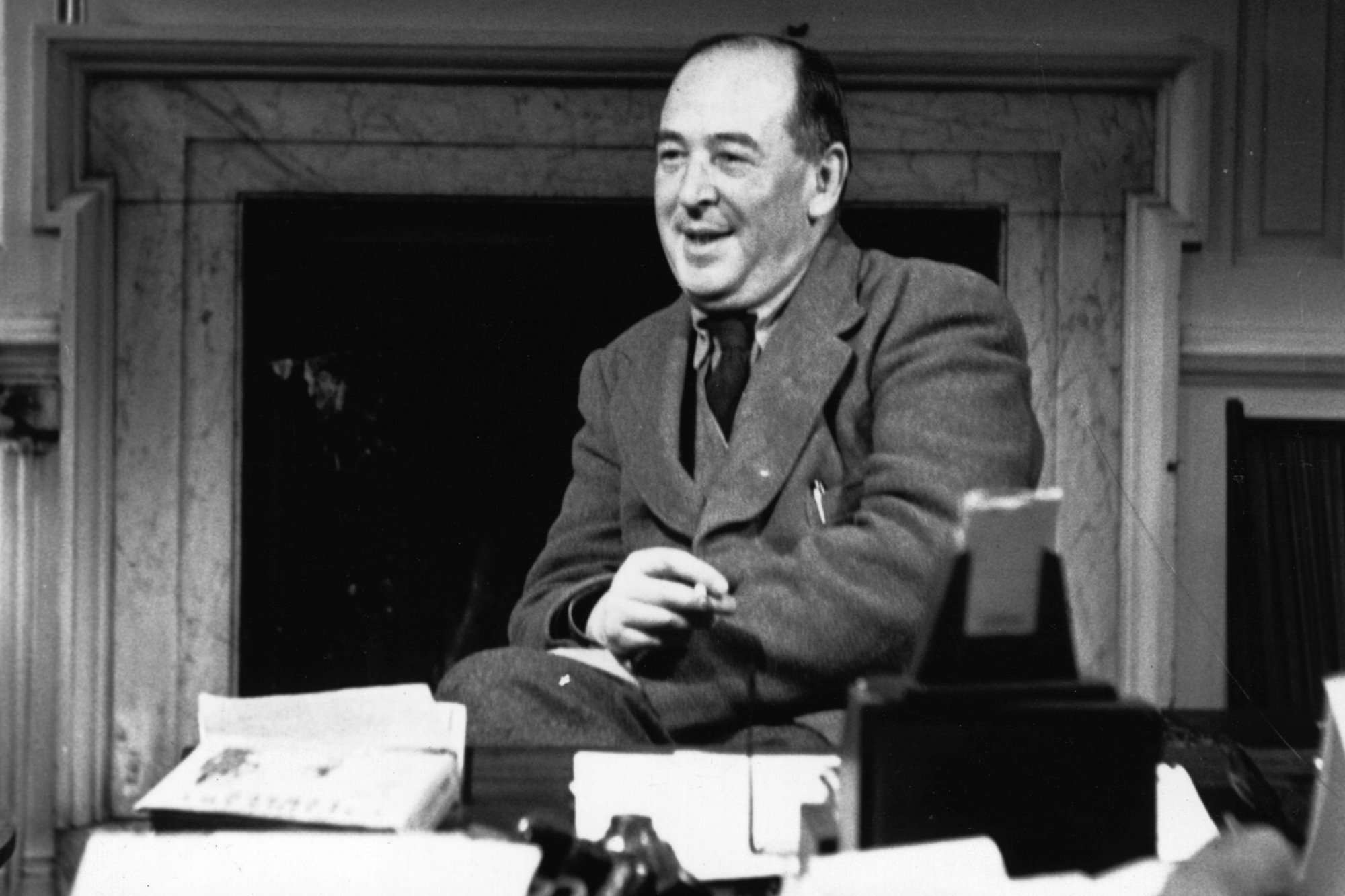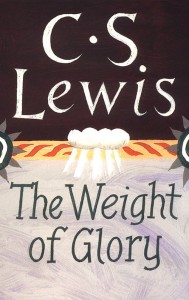Things I’ve Learned From C.S. Lewis
November 21st, 2013 | 9 min read

The world didn’t take much notice of C.S. Lewis on November 22, 1963, the day he died. It was too frenzied by the shocking assassination of John F. Kennedy, which occurred in Dallas about an hour after Lewis died in his Oxford home, The Kilns. Every moment of JFK’s assassination aftermath and funeral was watched by the world. His exit of this life had the attention of billions. Lewis departed quietly. Word of his death traveled slowly to many of his friends, and his funeral was poorly attended.
Lewis’ inauspicious end, however, was doubtless for him the most auspicious of beginnings. That day, before all hell broke loose on Dealey Plaza, all heaven broken open for Lewis, and for the first time the longings he so eloquently articulated in life were satiated; the weight of glory made material. On that day, he drank joy from the fountain of joy.
50 years later, Lewis is still drinking that joy–tasting at the fountainhead that stream of which we can only taste the lower reaches (but even so how intoxicating!). Meanwhile, for us, “the cross comes before the crown and tomorrow is a Monday morning.” But we carry on. And at least for me, the carrying on is a whole lot easier because of Lewis.
I’ve learned a lot from the man. His words have played a significant role in my spiritual, intellectual and professional development. Even before I spent a week living at the Kilns, sleeping in the room he slept in, I felt him to be a kindred spirit–a man who gave eloquent expression to my “inconsolable secret” and awareness of Sehnsucht.
The first time I visited Oxford was absolute magic. The “city of dreaming spires” was indeed a dream. One of the unforgettable moments from that first trip was an evening worship service at the University Church of St. Mary as part of the C.S. Lewis Foundation’s Oxbridge 2005 conference. Part of the program was a reading by British actor Joss Ackland of the entire text of “The Weight of Glory,” a sermon delivered by C.S. Lewis in the same church in 1941. It was quite something to hear those words–one of the most eloquent and profound sermons I’ve ever heard–in that church, on a humid summer evening likely similar to the summer night on which Lewis originally delivered the address.
Since then, “The Weight of Glory” has become one of my favorite Lewis works. It manages to capture an amazing amount of truth, beauty and longing in just a few short pages. I’ve read it a dozen or so times, and in re-reading it this week it struck me that there are a few key ideas that have particularly impacted me:
“We are far too easily pleased.”
The first part of “The Weight of Glory” examines desire and debunks the notion that it is wrong to desire too much; rather, argues Lewis, we desire too little:
If there lurks in most modern minds the notion that to desire our own good and to eagerly hope for the enjoyment of it is a bad thing, I submit that this notion…is no part of the Christian faith. Indeed, if we consider the unblushing promises of reward and the staggering nature of the rewards promised in the gospels, it would seem that our Lord finds our desires not too strong, but too weak. We are half-hearted creatures, fooling about with drink and sex and ambition when infinite joy is offered us, like an ignorant child who wants to go on making mud pies in a slum because he cannot imagine what is meant by the offer of a holiday at the sea. We are far too easily pleased.
This idea rang so true for me. I had sensed, ever since I was a young boy, that my deepest experiences of joy were often intimately tied with longing. I loved reading great books and watching awe-inspiring movies. I loved traveling and camping and exploring the creeks and rivers of my Oklahoma youth. But each of these things only fanned the flames of exploration and the longing in my soul. They whispered of even greater wonders. And that was the joy. It was the realization that what stirred my heart most when I encountered something beautiful was not the thing itself; but the reality that it was only a glimpse of something more. “They are only the scent of a flower we have not found,” wrote Lewis, “the echo of a tune we have not heard, news from a country we have never yet visited.”
“We cannot mingle with the splendours we see.”
One of my favorite sections of “The Weight of Glory” comes when Lewis elaborates on the bittersweet longing we feel when we encounter beauty:
We usually notice it just as the moment of vision dies away, as the music ends, or as the landscape loses the celestial light… For a few minutes we have had the illusion of belonging to that world. Now we wake to find that it is no such thing. We have been mere spectators. Beauty has smiled, but not to welcome us; her face turned in our direction, but not to see us. We have not been accepted, welcomed, or taken into the dance. We may go when we please, we may stay if we can, no one cares. Now, a scientist may reply that since most of the things we call beautiful are inanimate it is not very surprising that they take no notice of us. That, of course, is true. It is not the physical objects that I am speaking of, but that indescribable Something of which they become for a moment the messengers. And part of the bitterness which mixes with the sweetness of that message is due to the fact that it so seldom seems to be a message intended for us, but rather something we have overheard. By bitterness I mean pain, not resentment. We should hardly dare to ask that any notice be taken of ourselves. But we pine. The sense that in the universe we are treated as strangers, the longing to be acknowledged, to meet with some response, the bridge some chasm that yawns between us and reality, is part of our inconsolable secret.
This section illuminated for me a connection between my faith and my love of art and culture. The longings stirred up within me through a beautiful film or a beautiful sunset were exactly as Lewis describes: unsatisfied desires to not just observe something so beautiful but to be a part of it. And yet there are barriers: “we are on the outside of the world, the wrong side of the door. We discern the freshness and purity of morning, but they do not make us fresh and pure. We cannot mingle with the splendours we see.” For Lewis this is a reflection of the now-but-not-yet nature of glory, which he defines as the fact of being noticed and known by God, more fully than we have ever been known before (1 Corinthians 13:12). There’s a sorrow wrapped up within our present joy because we know the beauty, goodness and truth we touch in this life are only “through a mirror dimly.” But one day we’ll see the glory face to face. Lewis saw the glory 50 years ago today.
“There are no ordinary people.”
 For Lewis, the “weight” of glory is the mind-blowing reality that we will one day be in the presence of God and a pleasure to Him, “a real ingredient in the divine happiness … to be loved by God, not merely pitied, but delighted in as an artist delights in his work or a father in a son.” This improbable notion is the weight of glory. But weightier still is the reality that every human we’ll ever know–our neighbors, our classmates, our enemies–will either be glory-filled in heaven or gloriously hideous in hell, and “all day long we are, in some degree, helping each other to one or other of these destinations.”
For Lewis, the “weight” of glory is the mind-blowing reality that we will one day be in the presence of God and a pleasure to Him, “a real ingredient in the divine happiness … to be loved by God, not merely pitied, but delighted in as an artist delights in his work or a father in a son.” This improbable notion is the weight of glory. But weightier still is the reality that every human we’ll ever know–our neighbors, our classmates, our enemies–will either be glory-filled in heaven or gloriously hideous in hell, and “all day long we are, in some degree, helping each other to one or other of these destinations.”
What are the implications of this in our day to day lives? What Lewis says here is truly convicting, especially at a time when it seems so easy to abstract our enemies or wish ill upon the many people we encounter everyday (hundreds on Facebook, for example) who are irksome or difficult to abide:
There are no ordinary people. You have never talked to a mere mortal. Nations, cultures, arts, civilizations – these are mortal, and their life is to ours as the life of a gnat. But it is immortals whom we joke with, work with, marry, snub and exploit – immortal horrors or everlasting splendors. This does not mean that we are to be perpetually solemn. We must play. But our merriment must be of that kind (and it is, in fact, the merriest kind) which exists between people who have, from the outset, taken each other seriously – no flippancy, no superiority, no presumption. And our charity must be a real and costly love, with deep feeling for the sins in spite of which we love the sinners – no mere tolerance, or indulgence which parodies love as flippancy parodies merriment. Next to the Blessed Sacrament itself, your neighbor is the holiest object presented to your senses.
As with much of what I read in Lewis, I pray that I take these words to heart. I pray that I would always seek the “infinite joy that is offered us,” and that I would gladly, gracefully bear the weight of glory as Lewis did.
Enjoy the article? Pay the writer.
Brett McCracken is a Los Angeles-based journalist. He is the author of Hipster Christianity (2010) and Gray Matters (2013), and has written for the Wall Street Journal, the Washington Post, CNN.com, the Princeton Theological Review, Mediascape, Books & Culture, Christianity Today, Relevant, IMAGE Journal, Q Ideas, and Conversantlife.com. A graduate of Wheaton College and UCLA, Brett currently works as managing editor for Biola Magazine and teaches at Biola University. Follow him on Twitter @brettmccracken.
Topics: